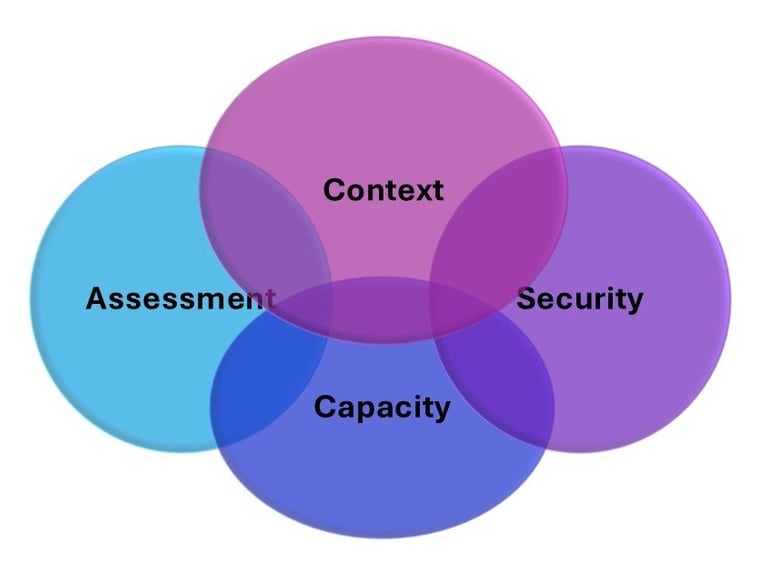A Life Project by Vicente (Tex) Hernandez
Forget Goals—Start with Values
We have discovered and, to some extent, believe that basic management principles—such as leadership, communication, capacity building, problem-solving, financial management, and planning—can help us become better and more fulfilled individuals. There is some truth to this. Managerial skills will undoubtedly transform us into achievers, but they may lead to contentment rather than true happiness.
LIFE MANAGEMENT
TH
8/19/20254 min read
Homo sapiens were anatomically similar to us. Our oldest known ancestor was discovered in 1960 at Jebel Irhoud, Morocco, during a mining operation that accidentally uncovered fossilized human remains. Initially thought to be just a mere 40,000 years old, newer dating methods have given these remains a much more impressive, and frankly surprising, age of 300,000 years. Despite these discoveries, much about the lifestyle of early Homo sapiens remains a mystery.
What were the challenges in the life of the Homo sapiens? Most likely, his life wasn’t very different from ours (hard to believe, right?), though the environment he lived in made his circumstances unique by modern standards.
He probably engaged in activities like foraging, providing for and defending his family from predators, seeking, or building shelter, relying on the strength of community, and making decisions about migration to improve his living conditions and secure an uncertain future. He would have planned and designed his life and future within the limits of his abilities and those of his community. In many ways, his goals and objectives wouldn’t have been much different from what we aim to achieve in our own lives. These similarities lead us to conclude that the foundations of the modern world, as we know it today, trace back to the caves and fields of the Upper Paleolithic period.
Current circumstances make modern life much more exciting compared to the challenging demands faced by the Jebel man. Today, extreme specialization is required. Professional associations demand certifications that were unheard of just a few years ago—it's not only occupations, but even a simple food stall at an annual fair now requires public health certification. Interacting with people from different languages, races, countries, cultural backgrounds, and training makes communication skills a real challenge. The overwhelming flood of data, information, and opinions from media across various platforms makes assimilation nearly impossible. The focus on performance, ignoring work schedules and physical or mental health, is turning professional careers into stressful nightmares. The focus on money and the power it gives is shifting attention away from important values like love, friendship, and family, turning people more selfish and self-centered. We need help.


The distress signals of modern life are being heard by many authors and experts, who offer advice and support for everyday challenges. We could say that we are witnessing the emergence of a new science, which we have started calling Life Management. We read about emotional management (Marie Kondo), balancing priorities (Stephen Covey), time management (David Allen), interpersonal skills (Dale Carnegie), personal mastery (Robin Sharma), and other specialized tools and skills developed by experts.
We have discovered and, to some extent, believe that basic management principles—such as leadership, communication, capacity building, problem-solving, financial management, and planning—can help us become better and more fulfilled individuals. There is some truth to this. Managerial skills will undoubtedly transform us into achievers, but they may lead to contentment rather than true happiness. Happiness is found in the balance of making sense, in the process of discovering meaning and significance—which is the central theme explored throughout the pages of this book.
Managerial skills, first and foremost, emphasize the importance of making the most of our time. This kind of universal principle raises an important question: Are the goals we set for ourselves truly worth pursuing? Aren’t we wasting our time? We spend years and years on tasks that bring only temporary satisfaction. Perhaps, we won’t realize that our life was sort of meaningless until later, when we retire and have more time to reflect on it. All these considerations outline the reasons for writing a book on Life Management.
Life Management is more than just handling personal projects: it's a holistic approach to managing every aspect of life, such as personal, professional, financial, health, family and relationships.
It’s a strategy for balancing and improving all areas to achieve overall well-being and fulfillment. It involves making thoughtful choices and taking intentional actions to reach sustainable aspirations and dreams. It benefits from essential skills like time management, goal setting, stress management, and self-discipline.


In the process of planning, let me take you a step further to evaluate success from a different perspective: the value of the outcome we are pursuing. Without recognizing this ultimate value, we risk pursuing an endless series of goals, achieving every objective along the way but ultimately getting nowhere, like chasing illusions or dreaming over dreams. Therefore, it makes a lot of sense to group our objectives into Areas of Interest, realigning them again and again according to the most meaningful and significant, identifying their ultimate value within the plans that we are drawing.
We conclude that significance and relevance are gained within what we could call Context—the state, condition, or position we find ourselves in. All other areas of interest act like the footing of Context, represented in a choice of meaningful goals we set for ourselves. These are named after the most commonsensible needs in our modern world: Assessment, Security, and Capacity.
(1) Context—the projected sense and direction of our life.
(2) Assessment—assets, liabilities, and opportunities.
(3) Security—planning for an unpredictable future.
(4) Capacity—the skills and the training that would support the achievement of our broader targets.
To effectively align our efforts with our most meaningful goals, we should reflect on the components of each area, breaking them down into specific objectives and so staging progress.
We also have tools at our disposal that help us move forward with confidence. For instance, planning in context is supported by the Value-Driven Life Management Model, while assessment can lead to rewarding employment opportunities aligned with our most important objectives.
Familiarity with Personal Finance Models includes skills such as investing, debt tracking, and budgeting which are essential in achieving financial security. Lastly, capacity is evaluated through personal, cognitive, and relational abilities, helping us cope with challenges while strengthening confidence and motivation.


Contact & Inquiries
info@echoepolaris.com
© 2025. All rights reserved.


If you have any feedback, comments, or questions, feel free to share your email address.
